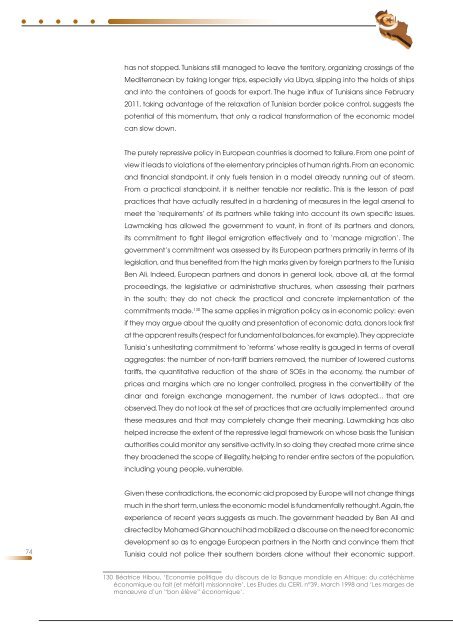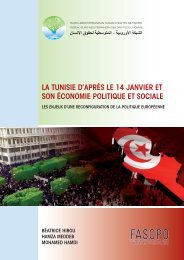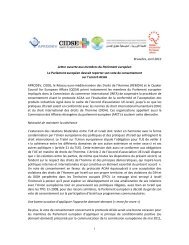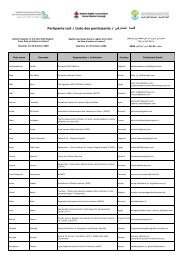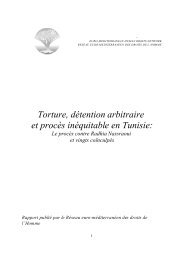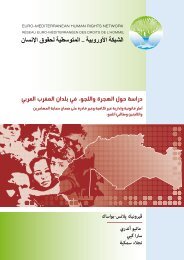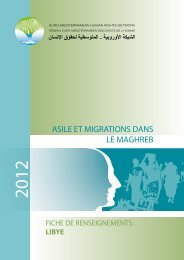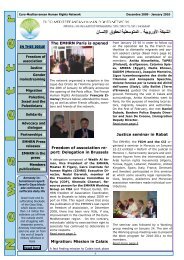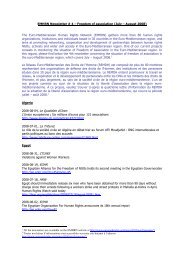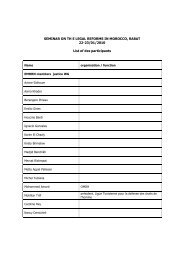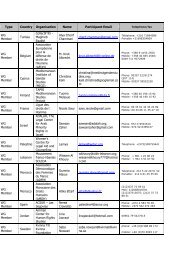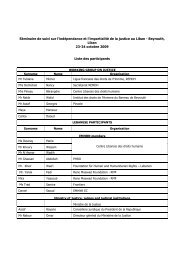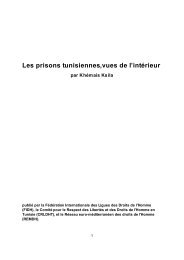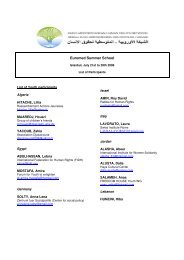tunisia after 14 january and its social and political economy - Refworld
tunisia after 14 january and its social and political economy - Refworld
tunisia after 14 january and its social and political economy - Refworld
You also want an ePaper? Increase the reach of your titles
YUMPU automatically turns print PDFs into web optimized ePapers that Google loves.
has not stopped. Tunisians still managed to leave the territory, organizing crossings of theMediterranean by taking longer trips, especially via Libya, slipping into the holds of ships<strong>and</strong> into the containers of goods for export. The huge influx of Tunisians since February2011, taking advantage of the relaxation of Tunisian border police control, suggests thepotential of this momentum, that only a radical transformation of the economic modelcan slow down.The purely repressive policy in European countries is doomed to failure. From one point ofview it leads to violations of the elementary principles of human rights. From an economic<strong>and</strong> financial st<strong>and</strong>point, it only fuels tension in a model already running out of steam.From a practical st<strong>and</strong>point, it is neither tenable nor realistic. This is the lesson of pastpractices that have actually resulted in a hardening of measures in the legal arsenal tomeet the ‘requirements’ of <strong>its</strong> partners while taking into account <strong>its</strong> own specific issues.Lawmaking has allowed the government to vaunt, in front of <strong>its</strong> partners <strong>and</strong> donors,<strong>its</strong> commitment to fight illegal emigration effectively <strong>and</strong> to ‘manage migration’. Thegovernment’s commitment was assessed by <strong>its</strong> European partners primarily in terms of <strong>its</strong>legislation, <strong>and</strong> thus benefited from the high marks given by foreign partners to the TunisiaBen Ali. Indeed, European partners <strong>and</strong> donors in general look, above all, at the formalproceedings, the legislative or administrative structures, when assessing their partnersin the south; they do not check the practical <strong>and</strong> concrete implementation of thecommitments made. 130 The same applies in migration policy as in economic policy: evenif they may argue about the quality <strong>and</strong> presentation of economic data, donors look firstat the apparent results (respect for fundamental balances, for example). They appreciateTunisia’s unhesitating commitment to ‘reforms’ whose reality is gauged in terms of overallaggregates: the number of non-tariff barriers removed, the number of lowered customstariffs, the quantitative reduction of the share of SOEs in the <strong>economy</strong>, the number ofprices <strong>and</strong> margins which are no longer controlled, progress in the convertibility of thedinar <strong>and</strong> foreign exchange management, the number of laws adopted... that areobserved. They do not look at the set of practices that are actually implemented aroundthese measures <strong>and</strong> that may completely change their meaning. Lawmaking has alsohelped increase the extent of the repressive legal framework on whose basis the Tunisianauthorities could monitor any sensitive activity. In so doing they created more crime sincethey broadened the scope of illegality, helping to render entire sectors of the population,including young people, vulnerable.74Given these contradictions, the economic aid proposed by Europe will not change thingsmuch in the short term, unless the economic model is fundamentally rethought. Again, theexperience of recent years suggests as much. The government headed by Ben Ali <strong>and</strong>directed by Mohamed Ghannouchi had mobilized a discourse on the need for economicdevelopment so as to engage European partners in the North <strong>and</strong> convince them thatTunisia could not police their southern borders alone without their economic support.130 Béatrice Hibou, ‘Economie politique du discours de la Banque mondiale en Afrique: du catéchismeéconomique au fait (et méfait) missionnaire’, Les Etudes du CERI, n°39, March 1998 <strong>and</strong> ‘Les marges demanœuvre d’un “bon élève” économique’.


